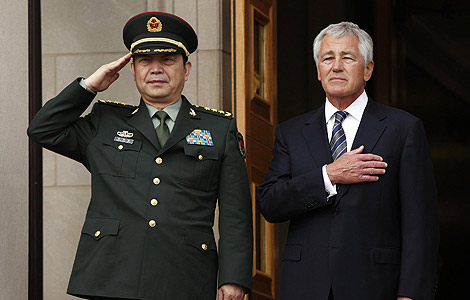Sound bites
Updated: 2013-08-20 10:49
(China Daily)
|
||||||||

Li Cheng, senior fellow and director of research of the John L Thornton China Center at the Brookings Institution:
Broadly, both militaries should establish some mechanisms for quick and effective communications to avoid any wrong information and miscalculation.
Specifically, both sides should have a better understanding of each other's concerns and real danger in the East China Sea and South China Sea, and thus maximize the chance for regional stability.
The US side should address the Chinese public concerns about the US-led containment against China and the Chinese side should be more articulate and candid about its strategic objective and strong domestic public opinion about China's territorial integrity and national sentiment.
Nothing is more important than the militaries in two major powers to prove their relationship in today's ever changing world and regional environment, to be strategic partners instead of rivalries.

Stapleton Roy, former US Ambassador to China and a Distinguished Scholar at the Wilson Center in Washington, DC:
This is the dilemma that national and defense leaders need to address: Is there a way to strike a stable balance between China's fundamental interest in defending its own territory and the fundamental American interest in preserving the credibility of US alliances? What is needed is some form of mutual assured restraint.
Historical experience suggests that barring the collapse of either side, there is no way to strike such a balance based on military capabilities alone. In short, this is not a defense problem but a problem of grand strategy, in which military capabilities must be viewed as only one element in an approach in which diplomacy, trade, and other components of national power must all be brought into play. Focusing on the military component in isolation from these other considerations will not resolve the dilemma. A more comprehensive approach is needed.
Hopefully, the discussions between PRC Defense Minister Chang and US Defense Secretary Hagel will move us closer to defining what this approach should be.

Zha Daojiong, professor, School of International Studies, Peking University:
The most urgent issue is how to manage third-country factors in military relations between Beijing and Washington. The governments of Japan and the Philippines are taking full advantage of that talk of "trust deficit" between Beijing and Washington. Behaviors on the part of Tokyo and Manila can lead to miscalculation in either Washington or Beijing. It is important to have a meeting of the minds between Beijing and Washington when it comes to words and deeds by Tokyo and Manila, in particular.
While it is entirely natural for big powers like China and the US to harbor concerns about each other's intent, at this stage in time, the US must work to convince China that its pursuit of military ties with Tokyo, Manila, Singapore, Canberra, and Hanoi, does not amount to a new, Cold War style encirclement of China. No amount of rhetoric can do the trick, and there has been no shortage of it out of the United States. For example, the US can think of having the Chinese military partake in bilateral military exercises it holds with some Southeast Asian nations.

Shen Dingli, Vice-dean of Institute of International Affairs, Fudan University:
The most urgent issues are maritime security issues -- the US naval presence in South China Sea area; China's perception of US military backing of Manila; the US perception of China's expanding appetite in the region; how to reconcile both.
The US should work with China to address China's need for marine and mineral resources; the Chinese side shall respect international law, especially the 1982 UNCLOS, with which some of China's current behaviors conflict.
China has already conducted joint naval drill with the US, at least off Hong Kong for search and rescue. The only thing China and the US need to expand is to conduct joint naval drills with combatant mode. It is not impossible to arrange this.
To conduct joint military drills doesn't mean the two militaries would not fight against each other. But not to do it would only increase the chance to do so.

Douglas Paal, Vice-President for Studies at Carnegie Endowment for International Peace:
Both military leaders should express what their political leaders Intended at Sunnylands, that is, to find a way to avoid falling into grinding and expensive military competition. To do that they need to open their strategic thinking to each other and search for common ground and ways to shrink suspicions. Advancing exchanges in military education programs would be an important early step.
The US officials should make clear they understand China's determination to avoid inferiority and explain that the two militaries will protect their respective interests, but not at the expense of the other. The notion of accepting China's eventual equal status needs to find expression. The alternative will be ruinously risky and expensive.
It takes time to be ready for full participation (of each other's military drills). We have difficulties even with long standing allies. That is why education is so important in developing common languages and techniques.
Our militaries want to do their best and not be taken by surprise, so an effort at maximum transparency, mutual efforts to read what is transparent about each other, can help reinforce the principle of "no surprises".
(China Daily USA 08/20/2013 page16)
Most Viewed
Editor's Picks

|

|

|

|

|

|
Today's Top News
Is a wave of Chinese IPOs on the horizon?
China, US militaries bolster ties
Western program new engine for growth
IMAX charges denied
China, Kenya agree to bolster ties
Online shopping clicking up
Typhoon wreaks havoc in the south
ROK-US drill starts as tensions ease with DPRK
US Weekly

|

|















